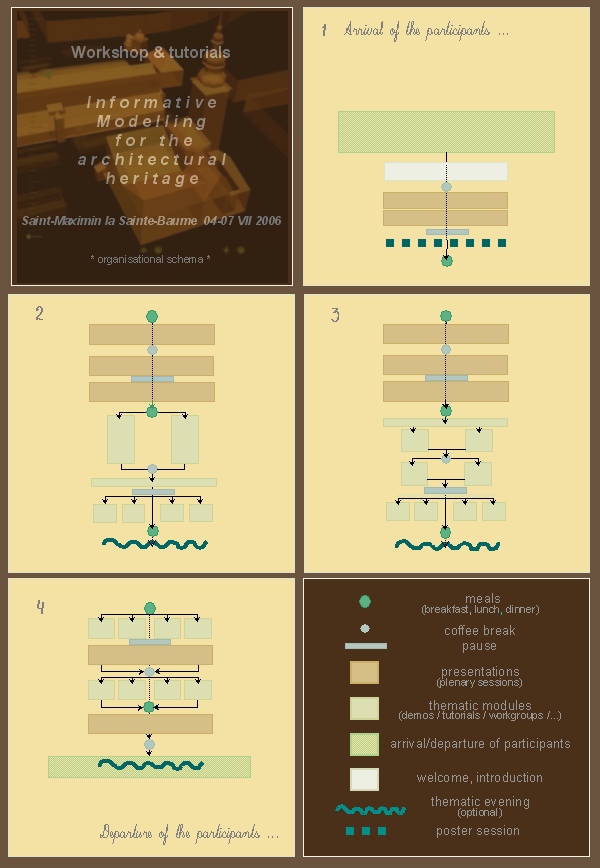| A short introduction to the workshop's programme |
|
The wokshop and tutorials are organised in two main steps :
- Identification of common references - an overview of recent works.
- Theoretical and practical aspects of informative modelling - case studies.
The modules include invited speeches and tutorials (demos, workgroups, individual practice, etc..),
with an ambition to have peole meet and discuss the challenges behind the terms informative modelling in a more structured way.
In various scientific disciplines (i.e. archaeology, history, ethnology, virtual reality, etc.) researchers and practitioners observe a common phenomenon, the architectural heritage, but from different angles and points of views, leaded by distinct reasons and distinct objectives. Therefore one of the workshop’s goals is to open an interdisciplinary discussion on
- Why do read differently the same phenomenon?
- Can informative modelling favour an integrated understanding of the
phenomenon? .
The workshop gathers researchers, scholars and specialists dealing with such
issues as analysis / spatial modelling / management / visualisation of patrimonial data.
|
|
| Outline of the programme |
|
The two main steps mentioned above are splitted into the following sequences:
A1 : Geometric modelling and representation of artefacts.
A2 : Modelling of patrimonial data and information visualisation.
B1 : Theoretical and practical foundations of informative modelling.
B2 : Critical analysis of case studies.
Before these sequences, a special session on the identification of the theme in relation
to its scientific/practical background is organised,
followed by a session during which participants are invited to comment
a poster they will provide on their work, enabling easier discussions among the audience.
These posters, which will be present during the fours days, will be accompanied by a 4 to 6 pages contribution included in the
proceedings. Note that the posters and contribution aim at fostering
scientific exchanges among participants and nothing else, they do
not necessarily need to be original, unpublished work.
Provisional list of speakers
|
| Pedagogical modes |
|
We intend to use the site and its history as a pedagogical tool in order to illustrate by practical
examples the confrontation of theory & practice (ex. 3D surveying in the cloister,
architectonic details analysis, etc.).
We believe that the interrelationship of the workshop’s theme with its physical environment may
help in delineating more accurately the main scientific
challenges we face in gaining insight into the evolution of historical sites.
Five types de modules are scheduled : invited speeches and four types of tutorials. The programme also includes
co-initiative modules and thematic (optional) evenings.
|
 downloads (PDF) downloads (PDF)
|
> programme
|
|
| "context + focus" on the programme |
keep the mouse above the modules (without clicking) in order to read their content.

|
|